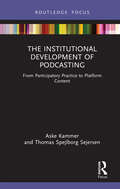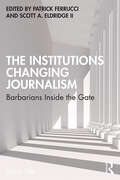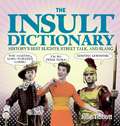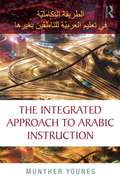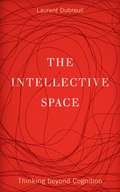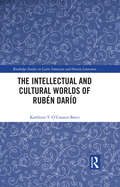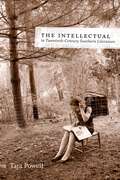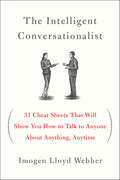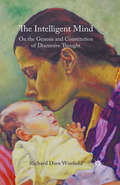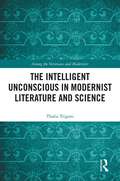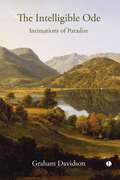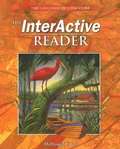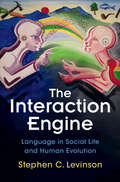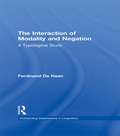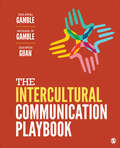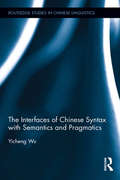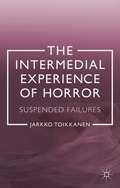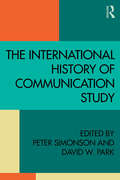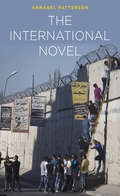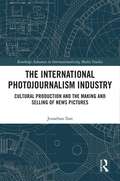- Table View
- List View
The Institutional Development of Podcasting: From Participatory Practice to Platform Content (Disruptions)
by Aske Kammer Thomas Spejlborg SejersenReferring back to the early 2000s, this book traces the development of podcasting from a “do-it-yourself” medium by amateurs into its current environment, where a wide variety of individuals, organizations, and platforms operate in an increasingly crowded and competitive market.Through original case studies of shows and platforms including "The Daily" and Spotify, the authors explore the processes and effects of commercialization, platformization, and datafication in the industry. Drawing on institutional theory and the growing body of scholarly literature about podcasting, they examine the shifts and reorientations in institutional logics that characterize podcasting and present the different types of actors that operate in the commercial and noncommercial podcast markets.The Institutional Development of Podcasting will be of interest to advanced students and researchers of audio media, journalism, and media industries.
The Institutions Changing Journalism: Barbarians Inside the Gate
by Patrick FerrucciBringing together original contributions from a worldwide group of scholars, this book critically explores the changing role and influence of institutions in the production of news. Drawing from a diverse set of disciplinary and theoretical backgrounds, research paradigms and perspectives, and methodologies, each chapter explores different institutions currently impacting journalism, including government bodies, businesses, technological platforms, and civic organisations. Together they outline how cracks in the autonomy of the journalism industry have allowed for other types of organizations to exert influence over the manner in which journalism is produced, funded, experienced and even conceptualized. Ultimately, this collective work argues for increased research on the impact of outside influences on journalism, while providing a roadmap for future research within journalism studies. The Institutions Changing Journalism is an invaluable contribution to the field of journalism, media, and communication studies, and will be of interest to scholars and practitioners alike who want to stay up to date with fundamental institutional changes facing in the industry.
The Insult Dictionary
by Julie TibbottDo you long for the days when a jerk was a "cad"? Want to tell that "swillbelly" to clean up his table manners and that grumbling "glump" to stop whining? Would you like a way of saying simpleton that's not quite so simple--"ninnyhammer," perhaps?All this nastiness and more can be found in the pages of this fun reference book. With insults ranging from Roman times (lutum lenonium = filthy pimp) and Shakespearean snipes (I'm talking to you, you knotty-pated fool) to salty pirate-speak and Wild West zingers, you're sure to find an insult for everyone, be they a helminth (a parasite in Ancient Greece) or a swinge-buckler (an Elizabethan braggart).Chapters are organized chronologically by historical period--Ancient Attacks, Medieval Madness, Edgy Elizabethans, Victorian Venom, Jazz Age Jibes, and Cold War Cuts--and include themed sidebars focusing on Pirate Put-Downs, Hobo Huffs, and Cowboy Curses, as well as samplers for words with many different sayings per period. Fun, a little bit lewd, and incredibly informative this is a must-read for humor fans, history buffs, armchair etymologists, and the most sneaping of breedbates.
The Integrated Approach to Arabic Instruction
by Munther YounesLeading teacher of Arabic, Munther Younes, explores the realities of teaching Arabic as a foreign language (AFL) and outlines his groundbreaking approach to instruction, tried and tested over many years at Cornell University. The Integrated Approach to Arabic Instruction introduces teachers to the features of an integrated Arabic program—one that simultaneously teaches the two varieties of the language, Modern Standard Written Arabic, fuṣḥā, and the dialect, āmmiyya, in a way that reflects the authentic practice of native Arabic speakers. This pedagogy, Younes argues, is the most logical, effective and economical method of instruction as it prepares students fully for the realities of the Arabic diglossic situation. Younes takes teachers through the following ground: Consideration of the current Arabic sociolinguistic situation and key debates in the field Outline of changing student goals and the needs of the modern AFL learner Overview of the Integrated Approach covering its rationale, features, implementation methods and usage of instructional materials in the classroom Response to objections to the Integrated Approach, outlining its advantages over alternative practices and clarifying crucial issues in practice The Integrated Approach to Arabic Instruction addresses a pressing issue deeply relevant to the world of Arabic language instruction, placed in the practical context of shifting attitudes among students and educators. It will be an essential resource for all teachers of Arabic as a Foreign Language.
The Intellective Space: Thinking beyond Cognition (Posthumanities #32)
by Laurent DubreuilThe Intellective Space explores the nature and limits of thought. It celebrates the poetic virtues of language and the creative imperfections of our animal minds while pleading for a renewal of the humanities that is grounded in a study of the sciences.According to Laurent Dubreuil, we humans both say more than we think and think more than we say. Dubreuil&’s particular interest is the intellective space, a space where thought and knowledge are performed and shared. For Dubreuil, the term &“cognition&” refers to the minimal level of our mental operations. But he suggests that for humans there is an excess of cognition due to our extensive processing necessary for verbal language, brain dynamics, and social contexts. In articulating the intellective, Dubreuil includes &“the productive undoing of cognition.&”Dubreuil grants that cognitive operations take place and that protocols of experimental psychology, new techniques of neuroimagery, and mathematical or computerized models provide access to a certain understanding of thought. But he argues that there is something in thinking that bypasses cognitive structures. Seeking to theorize with the sciences, the book&’s first section develops the &“intellective hypothesis&” and points toward the potential journey of ideas going beyond cognition, after and before computation. The second part, &“Animal Meditations,&” pursues some of the consequences of this hypothesis with regard to the disparaged but enduring project of metaphysics, with its emphasis on categories such as reality, humanness, and the soul.
The Intellectual Life of Colonial New England
by Samuel Eliot MorisonDescribes the thought of New England's scholars during the period.
The Intellectual and Cultural Worlds of Rubén Darío (Routledge Studies in Latin American and Iberian Literature)
by Kathleen T. O’Connor-BaterNicaraguan poet Rubén Darío (1867-1916) has had a foundational influence on virtually all Spanish language writers and poets of the twentieth century and beyond. Yet, while he is a household name among Hispano-phone readers, the seminal modernista remains virtually unknown to an English readership. This book examines the writings of Ruben Dario as both poet and chronicler, as he renovates language drawing lessons from ancient mythologies to embrace the ideal of "art for art’s sake"; all the while opposing United States aggression in the hemisphere along with the pseudo-Bohemian European bourgeoisie in poetry and prose at the cusp of the Great War.
The Intellectual as Hero in 1990s Ukrainian Fiction
by Mark AndryczykThe 1990s were a period of tremendous artistic vigour, experimentation, and liberation for Ukrainian culture. The artists who emerged at this time unleashed a tidal wave of creativity that deliberately and aggressively reshaped inherited models. In this first English monograph on contemporary Ukrainian literature, Mark Andryczyk provides an in-depth analysis of the cultural explosion that engulfed Ukraine in its first decade of independence. The Intellectual as Hero in 1990s Ukrainian Fiction weaves a fascinating narrative full of colourful characters by examining the prose of today's leading writers. Andryczyk delves into the role of the intellectual in forging a post-Soviet Ukrainian identity, and follows these protagonists as they soar and stumble in pursuit of redefining their creative realm. In addition to introducing readers to vibrant literary gems, this book explores the artistic tendencies that determined the course of the Ukrainian cultural scene in the 1990s, and continue to shape it today.
The Intellectual in Twentieth-Century Southern Literature: The Secret Diary of Robert Patrick, 1861--1865 (Southern Literary Studies)
by Tara PowellNever in its long history has the South provided an entirely comfortable home for the intellectual. In this thought-provoking contribution to the field of southern studies, Tara Powell considers the evolving ways that major post--World War II southern writers have portrayed intellectuals -- from Flannery O'Connor's ironic view of "interleckchuls" to Gail Godwin's southerners striving to feel at home in the academic world.Although Walker Percy, like his fellow Catholic writer O'Connor, explicitly rejected the intellectual label for himself, he nonetheless introduced the modern novel of ideas to southern letters, Powell shows, by placing sympathetic, non-caricatured intellectuals at the center of his influential works.North Carolinians Doris Betts and her student Tim McLaurin made their living teaching literature and creative writing in academia, and Betts's fiction often includes dislocated academics while McLaurin's superb memoirs, often funny, frequently point up the limitations of the mind as opposed to the heart and the spirit.Examining works by Ernest Gaines, Alice Walker, and Randall Kenan, Powell traces the evolution of the black American literacy narrative from a stress on the post-Emancipation conviction, which saw formal education as an essential means of resisting oppression, to the growing suspicion in the post--civil rights era of literacy acts that may estrange educated blacks from the larger black community.Powell concludes with Godwin, who embraces university life in her fiction as she explores what it means to be a southern female intellectual in the modern world -- a world in which all those markers inscribe isolation.
The Intelligent Conversationalist: 31 Cheat Sheets That Will Show You How to Talk to Anyone About Anything, Anytime
by Imogen Lloyd Webber“Gives readers the background and resources they need to effectively discuss a range of issues . . . as practical as it is hilarious.” —BustleHave you ever been at a cocktail party when all of a sudden you feel like an outsider in the conversation because you have absolutely no idea what the person is talking about? You’re standing around with a glass of wine and someone starts talking about how the stock market did that day leading to the career highs of Ben Bernanke and the best way to short a stock. You stand there completely silent because you know nothing about the stock market, let alone the history of economics. You’re being pushed to the outside edge of the pack and there’s no way to reach gracefully for your iPhone and Google. Fear not: Imogen Lloyd Webber is on a mission to make everyone as conversationally nimble as she has learned to be as a cable news pundit. Her solution: get a few cheat sheets and study up. Remember cheat sheets, those slips of paper filled with facts? As Imogen might say “Google is good, but a cheat sheet is forever . . . ” In eight cheat sheets, Imogen takes you through the facts that come up in most conversations: the English language, math/economics, religion, history, politics, geography, biology and culture. From the history of money to who signed The Magna Carta, Imogen shows you how to get back in a conversation, win any argument and most importantly, how to pivot out of a tough conversational bind. Imogen Lloyd Webber’s The Intelligent Conversationalist will help you talk with anyone about anything anytime.
The Intelligent Mind: On the Genesis and Constitution of Discursive Thought
by Richard Dien WinfieldThe Intelligent Mind conceives the psychological reality of thought and language, explaining how intelligence develops from intuition to representation and then to linguistic interaction and thinking. Overcoming the prevailing dogmas regarding how discursive reason emerges, this book secures the psychological possibility of the philosophy of mind.
The Intelligent Unconscious in Modernist Literature and Science (Among the Victorians and Modernists)
by Thalia TrigoniThis book reassesses the philosophical, psychological and, above all, the literary representations of the unconscious in the early twentieth century. This period is distinctive in the history of responses to the unconscious because it gave rise to a line of thought according to which the unconscious is an intelligent agent able to perform judgements and formulate its own thoughts. The roots of this theory stretch back to nineteenth-century British physiologists. Despite the production of a number of studies on modernist theories of the relation of the unconscious to conscious cognition, the degree to which the notion of the intelligent unconscious influenced modernist thinkers and writers remains understudied. This study seeks to look back at modernism from beyond the Freudian model. It is striking that although we tend not to explore the importance of this way of thinking about the unconscious and its relationship to consciousness during this period, modernist writers adopted it widely. The intelligent unconscious was particularly appealing to literary authors as it is intertwined with creativity and artistic novelty through its ability to move beyond discursive logic. The book concentrates primarily on the works of D. H. Lawrence, Virginia Woolf and T.S. Eliot, authors who engaged the notion of the intelligent unconscious, reworked it and offered it for the consumption of the general populace in varied ways and for different purposes, whether aesthetic, philosophical, societal or ideological.
The Intelligible Ode: Intimations of Paradise
by Graham DavidsonFrom its first publication, what is now known as the Immortality Ode has been praised for the magnificence of its verse and disparaged for its paucity of meaning - the 'immortality' of the subtitle unsubstantiated, and the 'recollections' insubstantial. Yet Wordsworth's idea of immortality has clear precedents in the seventeenth century, and recollections of childhood are Traherne's starting point for the recovery of a lost vision comparable to Wordsworth's. Via the power of the imagination, or reason, they believed they could experience a renewed vision that both termed variously Paradise, or infinity, or immortality. Graham Davidson traces the origins of Wordsworth's poetic impetus to his resistance to the Cartesian division between mind and nature, first adumbrated by the Cambridge Platonists. If reunited, Paradise was regained, but this personal trajectory was tempered by a deep sympathy for the woes of mortal life. Davidson explores the consequent dialogue through some of Wordsworth's best-known poems, at the heart of which is the Ode. In the last section, he demonstrates how Wordsworth's publishing history led the Victorians and modernists to misinterpret his work; if one considers Eliot's Four Quartets as odes, facing several of the same problems as did Wordsworth, there is some irony in Eliot's dismissal of the Immortality Ode as 'verbiage'.
The InterActive Reader (The Language of Literature)
by McDougal Littell Inc.This unique blend of grammar, writing, and communication instruction creates a dynamic program that teaches students not only how to use language, but why it is important. The grammar lessons in Language Network clearly and concisely teach key grammar skills reinforced with plenty of practice. Engaging activities show students the importance of grammar in cross-curricular study, in business, and in the everyday world.
The InterActive Reader Plus, with Additional Support
by Olga Bautista Sharon Sicinski-SkeansThe Inter Active Reader Plus with Additional Support provides all of the literature selections and all of the features from the Inter Active Reader Plus. If you are using McDougal Littell's 'The Language of Literature', you will find 'The InterActive reader Plus' to be a perfect companion. The literary selections in the reader can all be found in that book. The InterActive Reader Plus lets you read certain core selections from The language of Literature more slowly and in greater depth.
The Interaction Engine: Language in Social Life and Human Evolution
by Stephen C. LevinsonCommunicative interaction forms the core of human experience. In this fascinating book Levinson, one of the world's leading scholars in the field, explores how human communicative interaction is structured, the demands it puts on our cognitive processing, and how its system evolved out of continuities with other primate systems. It celebrates the role of the 'interaction engine' which drives our social interaction, not only in human life, but also in the evolution of our species – showing how exchanges such as words, glances, laughter and face-to-face encounters bring us our greatest and most difficult experiences, and have come to define what it means to be human. It draws extensively on the author's fieldwork with speakers across multiple cultures and communities, and was inspired by his own experiences during the Covid lockdown, when humans were starved of the very social interaction that shapes our lives. This title is also available as open access on Cambridge Core.
The Interaction of Modality and Negation: A Typological Study (Outstanding Dissertations in Linguistics)
by Ferdinand De HaanFirst Published in 1997. This book is an updated version of the author's 1994 dissertation, submitted to the Graduate School of the University of Southern California. With updated references footnotes pointing to research published after May 1994, this study of modality showcases its long history. Yet, for many centuries it seemed to be the exclusive domain of philosophers. It was not recognized by linguists as a separate object for study until comparatively recent times. The author argues that the other component of this study, negation, has fared much better.
The Intercultural Communication Playbook
by Teri Kwal Gamble Michael W. Gamble Xiaowen GuanFeaturing a three-prong approach on culture, communication, and creative problem solving, The Intercultural Communication Playbook, with its unique, user-friendly layout and presentation, highlights how active, imaginative, and productive problem-solving methods can transform the way students understand intercultural communication. This framework from authors Teri Kwal Gamble, Michael W. Gamble, and Xiaowen Guan guides learners to understand their intercultural identity, broaden their worldview, and successfully improve their communication in real-world settings. Each chapter features exercises that encourage students to diversify their everyday thinking, individually examine their personal preferences, eliminate mental barriers, and discover innovative solutions to intercultural communication challenges.
The Intercultural Communication Playbook
by Teri Kwal Gamble Michael W. Gamble Xiaowen GuanFeaturing a three-prong approach on culture, communication, and creative problem solving, The Intercultural Communication Playbook, with its unique, user-friendly layout and presentation, highlights how active, imaginative, and productive problem-solving methods can transform the way students understand intercultural communication. This framework from authors Teri Kwal Gamble, Michael W. Gamble, and Xiaowen Guan guides learners to understand their intercultural identity, broaden their worldview, and successfully improve their communication in real-world settings. Each chapter features exercises that encourage students to diversify their everyday thinking, individually examine their personal preferences, eliminate mental barriers, and discover innovative solutions to intercultural communication challenges.
The Interfaces of Chinese Syntax with Semantics and Pragmatics (Routledge Studies in Chinese Linguistics)
by Yicheng WuThe Interfaces of Chinese Syntax with Semantics and Pragmatics provides an in-depth exploration of a variety of interface phenomena in Chinese, a non-inflectional language, where to a large extent word order constrains its interpretation and defines its grammatical functions. Under the Dynamic Syntax approach, which takes the incremental left-to-right processing of linguistic forms to be a fundamental part of characterizing the relation between syntactic structure and semantic interpretation, a straightforward explanation is provided. The study features detailed analysis of a range of key grammatical constructions such as topic, passive, copular and cleft, where previous analyses were sought in pure syntactic, semantic or pragmatic terms. Clear and straightforward throughout, The Interfaces of Chinese Syntax with Semantics and Pragmatics will be of interest to graduate students and scholars of Chinese, linguistics and cognitive science.
The Intermedial Experience of Horror
by Jarkko ToikkanenThis book is an exploration of the phenomenon of horror from an unusual angle. Focusing on reading specific examples of literature from Romanticism to Modernism, the study brings together the phenomenon of horror with the topical concepts of experience and intermediality and highlights the complex relations they present.
The International Distribution of News
by Jonathan Silberstein-LoebBased on newly available and extensive archival evidence, this book traces the history of international news agencies and associations around the world from 1848 to 1947. Jonathan Silberstein-Loeb argues that newspaper publishers formed news associations and patronized news agencies to cut the costs of news collection and exclude competitors from gaining access to the news. In this way, cooperation facilitated the distribution of news. The extent to which state regulation permitted cooperation, or prohibited exclusivity, determined the benefit newspaper publishers derived from these organizations. This book revises our understanding of the operation and organization of the Associated Press, the BBC, the Press Association, Reuters, and the United Press. It also sheds light on the history of competition policy respecting the press, intellectual property, and the regulation of telecommunications.
The International History of Communication Study
by Peter Simonson David W. ParkThe International History of Communication Study maps the growth of media and communication studies around the world. Drawing out transnational flows of ideas, institutions, publications, and people, it offers the most comprehensive picture to date of the global history of communication research and education. This volume reaches into national and regional areas that have not received much attention in the scholarship until now, including Asia, Latin America, Africa, and the Middle East alongside Europe and North America. It also covers communication study outside of academic settings: in international organizations like UNESCO, and among commercial and civic groups. It moves beyond the traditional canon to cover work by forgotten figures, including women scholars in the field and those outside of the United States and Europe, and it situates them all within the broader geopolitical, institutional, and intellectual landscapes that have shaped communication study globally. Intended for scholars and graduate students in communication, media studies, and journalism, this volume pushes the history of communication study in new directions by taking an aggressively international and comparative perspective on the historiography of the field. Methodologically and conceptually, the volume breaks new ground in bringing comparative, transnational, and global frames to bear, and puts under the spotlight what has heretofore only lingered in the penumbra of the history of communication study.
The International Novel
by Annabel PattersonAnnabel Patterson here turns her well-known concern with political history in early modern England into an engine for investigating our own era and a much wider terrain. The focus of this book is, broadly, nationalism and internationalism today, approached not theoretically but through the lens of fiction. Novels are uniquely capable of dealing with abstract problems by embodying them in the experience of persons, thereby rendering them more "real." Patterson takes twelve novels from (almost) all over the world: India, Africa, Turkey, Crete, the Balkans, Palestine, Afghanistan, South America, and Mexico, novels which illustrate the dire effects of some of the following: imperialism, partition, annexation, ethnic and religious strife, boundaries redrawn by aggression, the virus of dictatorships, the vulnerability of small countries, and the meddling of the Great Powers. All are highly instructive, and excellent reads.
The International Photojournalism Industry: Cultural Production and the Making and Selling of News Pictures (Routledge Advances in Internationalizing Media Studies)
by Jonathan IlanHow are events turned into news pictures that define them for the audience? How do events become commodified into pictures that both capture them and reiterate the values of the agencies that sell them? This book looks at every stage of the production of news photographs as they move to and from the ground and are sold around the world. Based on extensive fieldwork at a leading international news agency that includes participant observation with photographers in the field, at the agency’s local and global picture desks in Israel, Singapore, and the UK, in-depth interviews with pictures professionals, and observations and in-depth interviews at The Guardian’s picture desk in London, the findings in this book point to a wide cultural production infrastructure hidden from – and yet also nurtured and thus very much determined by – the consumer’s eye.
